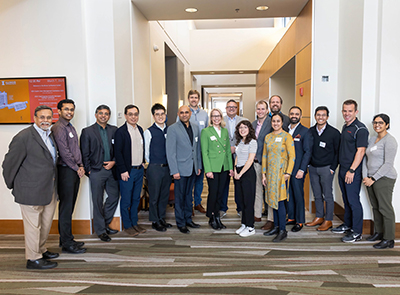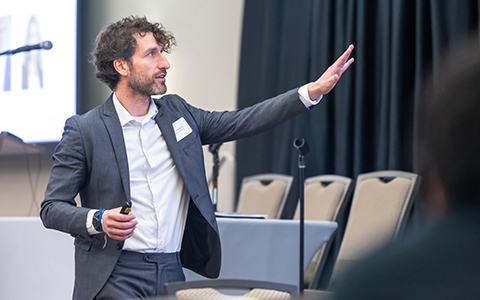Apr 15, 2025
Gies hosts Supply Chain Management Conference on sustainability, social responsibility
Sustainability and social responsibility took center stage at the second annual Supply Chain Management Conference, hosted by Gies College of Business on March 7-8.
More than 70 academics, industry leaders, and students gathered to explore how companies can minimize environmental impact and strengthen ethical practices across supply chains. The success of this year’s conference was made possible by the leadership of its organizing team: Mili Mehrotra, Hanu Tyagi, Vanitha Virudachalam, and Marieli Lopez. With support from the Gies Business Supply Chain Management Program, the team curated a two-day event focused on turning big ideas about sustainability and social responsibility into actionable conversations.
"Our main goal for this year's gathering was to create a platform for meaningful dialogue on sustainability and social responsibility challenges and solutions between academia, industry, and policymakers," said Tyagi, assistant professor of business administration.

Mehrotra, associate professor of business administration and academic director of the Illinois Supply Chain Management Program, added the importance of using the space for student learning.
"Another goal was to provide a platform for students to learn about recent research and developments in supply chains regarding sustainability and social responsibility," she said.
The organizers shared a priority: bridging theory with real-world applications.
"We aimed to go beyond theoretical discussions and encourage actionable insights that could drive tangible change," said Tyagi.
"I think there's so much value to grounding research in reality,” said Virudachalam, assistant professor of business administration. “It’s important for academics to understand the challenges faced by industry, and for industry to hear about the ideas put forth by academics. This is also a great way for our students to understand how supply chain concepts they learn about in the classroom actually translate to real life."
The two-day program featured two insightful keynotes from leading scholars in supply chain management.
Karen Donohue, professor and W. P. Carey distinguished chair at Arizona State University, delivered the first keynote on the challenges operations managers face in integrating environmentally friendly practices and explored how behavioral studies can provide insights and recommendations for better adoption.
Jury Gualandris, associate professor of operations management & sustainability at Ivey Business School, Western University, delivered the second keynote, "From Eco-efficient Networks to Eco-effective Communities." Gualandris advocated for a shift toward "regenerative supply chains," emphasizing the importance of economically sustainable systems that contribute to ecological well-being.
Beyond the compelling keynote speeches, the conference featured a range of sessions and discussions that underscored the multifaceted nature of sustainability and social responsibility in supply chains. Academic researchers presented their latest findings on topics like inclusion in sustainability practices, exploring disparities in aid for natural disasters, and the impact of international trade on air-quality-related mortality.

Other sessions dove into environmental sustainability, covering issues like renewable power purchase agreements, carbon targets, and the benefits and challenges of renewable natural gas projects. Sessions exploring social responsibility and markets examined the value of social responsibility communications, employment models for individuals with disabilities, and the role of negative disclosure in supply chains.
In the quiet moments before the conference, Virudachalam emphasized the wide variety of perspectives in attendance, from industry leaders to academics and students.
"Our big picture goal is to bring together different populations - students, industry panelists, and researchers - so we can have substantive and impactful conversations about sustainability and social responsibility."
That spirit of collaboration echoed throughout the proceedings. While this year’s conference brought together academics and industry leaders from across North America, the organizers made an effort to highlight voices from across the University of Illinois and the local community. Illinois researchers from multiple campus units – such as Tatyana Deryugina in Finance, Sandeep Srinivas in Business Administration, and Christopher Tessum at the Grainger College of Engineering – joined local business leaders like Nina Kshetry of Ensaras and Gautam Gundiah of APL Engineered Materials. The conference also featured corporate leaders with Illinois ties, including Brandon Rick of ADM Trucking and Brett Lukowicz of Echo Global Logistics. Their perspectives underscored the conference’s commitment to fostering meaningful cross-sector dialogue.
As the conference drew to a close, speakers and attendees reflected on the ideas that emerged over the two days of dialogue, and what they might signal for the future of the field.
Gopesh Anand, professor of business administration and area chair for information systems, operations, supply chain, and analytics, captured the spirit of the conference in his closing remarks, describing the central challenge as finding the balance between "doing good," serving people and the planet, and "doing well," sustaining business success.
Looking ahead, conference organizers hope to expand the event's reach and explore emerging areas at the intersection of sustainability and innovation.
"We see this conference as evolving into a widely recognized forum for thought leadership in supply chain management," said Tyagi. "A key focus for next year could be the integration of technology, machine learning, and artificial intelligence. This opens up exciting discussions around ethical implications, productivity, and the future of human-technology collaboration in sustainable operations."
Mehrotra echoed the importance of involving students in those forward-looking conversations.
"I would like to expose our undergraduate students to the latest research in supply chain management, enabling them to absorb new insights and carry that learning into their future workplaces."
For Tyagi, the takeaway is clear: sustainability can't be a standalone effort.
"Sustainability must be woven into every facet of business, policy, and research. As Carlos Torelli (head of the department of business administration) aptly emphasized, collaboration is essential - no single entity can address these challenges alone."
As the conversation continues to evolve, Gies Business remains committed to driving innovation and impact in the future of global supply chains.
